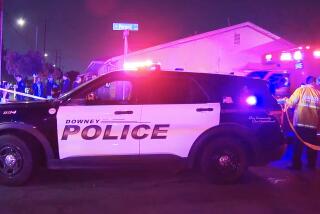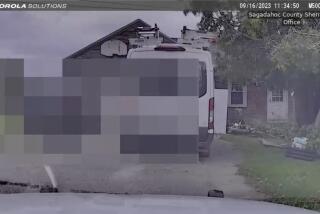Iraq vet was in a tailspin before he died in a hail of police bullets at home
- Share via
Gerry Chicorelli was driving north on Paramount Boulevard in Downey in late March when he spotted a man holding a hatchet and walking into southbound traffic.
The man had a glazed look. Drivers braked and yelled at him, peeling away as they spotted the raised hatchet in his hands.
Chicorelli realized he knew the man.
It was Steve Bours, a handsome kid who’d once worked for him in his roofing business.
Bours, 30, had joined the Army Reserve and was sent to Iraq in 2004 with a supply unit based near Fallouja, site of the war’s most brutal battle.
Chicorelli was the third or fourth to call 911. As he slowed his car to a crawl, he watched Bours march, hatchet raised, into traffic for what would be the last hundred yards of his life.
The whole time, Chicorelli recalled, “he never said a word.”
* * *
In November 2003, the 208th Transport Unit was assembled with Army reservists from Arizona, California and Nevada. They trained at Ft. Bliss, Texas, and the following March went to Iraq.
Bours was among them. He had grown up in south Downey, left high school, then earned his GED to be admitted to the Army Reserve in 2000, his family said. He married, had two sons and worked for his father’s alarm company while hoping he might find a future in the Army.
He didn’t plan on war. “Then 9/11 happened and he knew he’d have to go sooner or later,” said his father, Ronald.
Bours had wrestled and played football in high school. He practiced jujitsu and taught himself guitar. Friends say he occasionally used methamphetamine in the mid-1990s, when the drug was scarce.
Athletic and muscular, he was quiet and sweet-natured — a “gentle giant,” people called him.
In Iraq, he spoke little, listened a lot and was intensely loyal. “You always knew he had your back,” said Jennifer Kramer, a friend from the 208th.
His fellow soldiers say Bours’ manner helped them endure the war.
“You have the quiet people like Steve who didn’t say much, but when it came time [for missions] they’d volunteer,” Danny Rivas said.
Bours’ room became the place to hang out.
“You could tell Steve anything,” Rivas said, “but I think Steve felt like he was there to listen and he didn’t have an outlet, people he could talk to about his problems.”
The 208th drove supplies to fighting units around Iraq. Insurgents were beginning to use improvised explosive devices to attack convoys. Bours often stood guard on gun trucks that shepherded the supply trucks.
On Dec. 13, 2004, a unit sergeant, Tina Time, was killed when the supply truck she was driving collided with an oncoming U.S. military vehicle in a sandstorm.
Time, the first Samoan American woman killed in combat, was beloved in the 208th. Her death was “a turning point,” Kramer said. “People just lost it. You’d see all these really tough guys breaking down all the time.”
Bours told his family he had had to retrieve Time’s severed torso when no one else wanted to. It was the one event from the war that he later spoke of, his family recalled.
In March 2005, the 208th returned home. Rivas and Bours met at a Starbucks two days later and Bours said nothing for an hour.
“A lot of people moved on,” Rivas said. “Steve, I don’t think he ever did.”
Back working for his father, Bours lost interest in everything. His marriage dissolved, adding to his depression.
“He seemed lonely even though there was always people around,” said Laura Cosentino, his half sister. “He wasn’t who he was when he went in.”
* * *
The town he returned to had changed as well.
Mexican drug traffickers had readjusted their product offerings, importing more methamphetamine than cocaine. In Downey, police began taking down dealers with pounds of the stuff.
By 2005, “the majority of dope that we were coming across and seizing was meth,” said Sgt. Gil Toledo of the Downey Police Department.
Friends and family said Bours soon began using the drug regularly.
Rivas and Joey Gonzales, a childhood friend and ex-Marine, took Bours on hikes in Griffith Park to get him exercising again.
Rivas found him a Veterans Affairs drug program. Bours needed several clean urine samples before the VA would admit him. Gonzales got him a gym membership and they worked out.
But the drug was everywhere. Bours began injecting it.
The last two years “was as bad as it got,” Rivas said. Some of Bours’ teeth cracked and fell out. Kramer saw a man “who looked like he was addicted to drugs.”
On Feb. 22, police tried to stop Bours as he walked on Paramount Boulevard late at night. He scuffled with officers. They apparently used a Taser on him three times, but did not arrest him. Instead, they left him at a hospital.
Weeks later, Bours still couldn’t remember details of the February incident, according to family members who are trying to get police and hospital reports.
On March 19, Bours went to the VA with chest pains. A doctor found nothing wrong and made him an appointment with a psychiatrist for the next day.
That Saturday, March 20, Cosentino drove him to the VA, but the office was closed, so they made an appointment for the following Monday. They took a long way home. “I was worried about him making it to Monday,” his half sister said.
Later that afternoon, Bours told his family he was going to a friend’s house to sharpen a hatchet he used for woodworking.
On his way, he passed Jerry and Olga Hernandez as they strolled Bours’ street near dusk. They remember a quiet, smiling Bours holding a hatchet the size of a hammer, but Jerry said later they felt no threat from him.
* * *
Shortly after 6:30 p.m., an unmarked police car squealed onto Paramount Boulevard and screeched to a halt. Two officers got out and drew their guns on the man with the hatchet walking in traffic.
From his truck across the street, Chicorelli had monitored Bours’ advance while talking to a 911 dispatcher. The officers repeatedly ordered Bours to drop his hatchet and get down.
The intersection froze. “Everybody just stood there and watched,” Chicorelli said. “It was like a TV show.”
Bours walked up to the front of the police car. Good, maybe this is over now, Chicorelli recalled thinking. Then Bours went around the open passenger door, hatchet still raised, advancing as the officer stepped back.
“As he came around the door, the cop was already backing up and he shot him,” Chicorelli said.
The first shot opened a round red stain on the chest of Bours’ white shirt. The officers fired eight shots in all.
The intersection erupted. Women at the gas station screamed and flailed on the ground. Downey police cars were suddenly everywhere. An ambulance whisked Bours away.
Nine days later, Bours was buried with full military honors at Riverside National Cemetery. He leaves young sons cared for by his ex-wife, who has cancer, relatives say.
Twenty soldiers who served with Bours attended his funeral. All struggled to square the glazed, hatchet-bearing man marching through traffic with the quiet, strong comrade who always had their back.
Downey police declined to comment on the case, which remains under investigation by the Los Angeles County Sheriff’s Department.
But shortly after the incident, a Sheriff’s Department press officer released a description of events similar to Chicorelli’s. A coroner’s toxicology report will determine whether drugs were in Bours’ system.
Bours’ family is rubbed raw — their son killed by police on an American street after he served his country in Iraq. They say the hatchet he carried was about 7 inches long. Sheriff’s investigators say it measures 2 feet. Chicorelli said it was more than a foot long.
Ronald Bours wonders why officers couldn’t have wounded his son — an idea that sheriff’s investigators dismiss as part of Hollywood fantasy, not police reality. When guns are fired, they say, police intend only one thing.
Family members are meeting with the late Johnnie Cochran’s law firm.
“I don’t think anyone thinks they shot Steve for no reason,” said Gonzales, his childhood friend. “We just wish they would have tried something else.”


